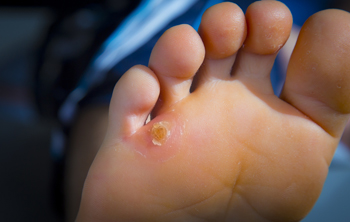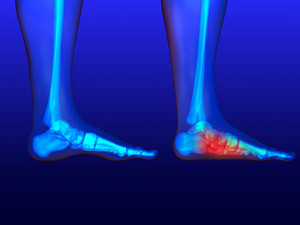Items filtered by date: October 2024
Get Proper Treatment for Ankle Injuries
Painful Corns

Corns are a common skin condition, with distinct characteristics and causes. Corns are thickened patches of skin that develop due to friction or pressure, often on the toes or soles. They are usually smaller than warts and have a hard center surrounded by inflamed skin. Symptoms of problematic corns include localized pain and tenderness. Wearing shoes with plenty of room for the toes is the best way to prevent corns. If your toes cannot wiggle and move around, the shoes are likely too tight. Persistent corns that cause significant discomfort may require medical intervention. A podiatrist may recommend cryotherapy, laser treatment, or surgical removal. If you have corns that do not improve, it is suggested you schedule an appointment with a podiatrist for a thorough evaluation and effective treatment options.
Corns can make walking very painful and should be treated immediately. If you have questions regarding your feet and ankles, contact Kent DiNucci, DPM of Ankle and Foot Clinic . Our doctor will treat your foot and ankle needs.
Corns: What Are They? And How Do You Get Rid of Them?
Corns are thickened areas on the skin that can become painful. They are caused by excessive pressure and friction on the skin. Corns press into the deeper layers of the skin and are usually round in shape.
Ways to Prevent Corns
There are many ways to get rid of painful corns such as:
- Wearing properly fitting shoes that have been measured by a professional
- Wearing shoes that are not sharply pointed or have high heels
- Wearing only shoes that offer support
Treating Corns
Although most corns slowly disappear when the friction or pressure stops, this isn’t always the case. Consult with your podiatrist to determine the best treatment option for your case of corns.
If you have any questions please feel free to contact our office located in Omaha, NE . We offer the newest diagnostic and treatment technologies for all your foot and ankle needs.
Preventing Same Level Falls in the Workplace

Same level falls occur when individuals trip, slip, or stumble on surfaces at the same height they are standing on, often leading to injuries that can affect productivity and morale. To prevent these incidents in the workplace, it is vital to implement several strategies. First, using appropriate flooring can significantly reduce the risk. Non-slip surfaces are ideal in high-traffic areas. Regularly removing obstacles such as clutter, cords, and equipment can create a safer environment. Promptly cleaning up spills and ensuring that wet floors are marked with clear signage is essential for alerting employees to potential hazards. Additionally, wearing protective gear, such as slip-resistant shoes, can further enhance safety. Falling can seriously impact the feet, which may cause a loss of work and wages. If you have had a foot injury from falling, it is suggested that you consult a podiatrist who can treat various foot injuries, and guide you on appropriate fall prevention methods in the work environment.
Preventing falls among the elderly is very important. If you are older and have fallen or fear that you are prone to falling, consult with Kent DiNucci, DPM from Ankle and Foot Clinic . Our doctor will assess your condition and provide you with quality advice and care.
Every 11 seconds, an elderly American is being treated in an emergency room for a fall related injury. Falls are the leading cause of head and hip injuries for those 65 and older. Due to decreases in strength, balance, senses, and lack of awareness, elderly persons are very susceptible to falling. Thankfully, there are a number of things older persons can do to prevent falls.
How to Prevent Falls
Some effective methods that older persons can do to prevent falls include:
- Enrolling in strength and balance exercise program to increase balance and strength
- Periodically having your sight and hearing checked
- Discuss any medications you have with a doctor to see if it increases the risk of falling
- Clearing the house of falling hazards and installing devices like grab bars and railings
- Utilizing a walker or cane
- Wearing shoes that provide good support and cushioning
- Talking to family members about falling and increasing awareness
Falling can be a traumatic and embarrassing experience for elderly persons; this can make them less willing to leave the house, and less willing to talk to someone about their fears of falling. Doing such things, however, will increase the likelihood of tripping or losing one’s balance. Knowing the causes of falling and how to prevent them is the best way to mitigate the risk of serious injury.
If you have any questions, please feel free to contact our office located in Omaha, NE . We offer the newest diagnostic and treatment technologies for all your foot care needs.
Facts About Dislocated Toes

A dislocated toe occurs when the bones in the toe become misaligned, often leading to significant discomfort and mobility issues. Common symptoms include intense pain at the site of the injury, noticeable swelling, and bruising. The affected toe may appear deformed or out of place, and there may be difficulty moving it or walking without pain. Several factors contribute to dislocated toes, with sports injuries being a leading cause. Activities involving running, jumping, or sudden changes in direction can put excessive stress on the toe joints. Also, accidents such as stubbing the toe or dropping a heavy object on it can lead to dislocation. If you have sustained an injury that may have dislocated your toe, it is suggested that you promptly contact a podiatrist who can provide an accurate diagnosis and treatment.
Toe pain can disrupt your daily activities. If you have any concerns, contact Kent DiNucci, DPM of Ankle and Foot Clinic . Our doctor can provide the care you need to keep you pain-free and on your feet.
What Causes Toe Pain?
Most severe toe pain is caused due to a sports injury, trauma from dropping something heavy on the toe, or bumping into something rigid. Other problems can develop over time for various reasons.
Toe pain can be caused by one or more ailments. The most common include:
- Trauma
- Sports injury
- Wearing shoes that are too tight
- Arthritis
- Gout
- Corns and calluses
- Hammertoe
- Bunions
- Blisters
- Ingrown toenails
- Sprains
- Fractures (broken bones)
- Dislocations
When to See a Podiatrist
- Severe pain
- Persistent pain that lasts more than a week
- Signs of infection
- Continued swelling
- Pain that prevents walking
Diagnosis
In many cases the cause of toe pain is obvious, but in others, a podiatrist may want to use more advanced methods to determine the problem. These can range from simple visual inspections and sensation tests to X-rays and MRI scans. Prior medical history, family medical history, and any recent physical traumatic events will all be taken into consideration for a proper diagnosis.
Treatment
Treatments for toe pain and injuries vary and may include shoe inserts, padding, taping, medicines, injections, and in some cases, surgery. If you believe that you have broken a toe, please see a podiatrist as soon as possible.
If you have any questions please feel free to contact our office located in Omaha, NE . We offer the newest diagnostic tools and technology to treat your foot and ankle needs.
Facts About Flat Feet

Pes planus, commonly known as flat feet, is caused by the loss of the medial longitudinal arch of the foot. This results in the entire sole making contact with the ground, leading to a flat appearance. Various factors contribute to the development of pes planus. Genetic predisposition plays a significant role, as some individuals inherit a tendency for weak arches. Additionally, obesity places excess strain on the feet, weakening the arch over time. Other causes include injuries or conditions that damage the tendons supporting the arch, such as posterior tibial tendon dysfunction. Chronic conditions like diabetes and rheumatoid arthritis can also contribute to the loss of the arch. If you have flat feet, it is suggested that you are under the care of a podiatrist who can offer you comfort options and help you to manage this condition.
Flatfoot is a condition many people suffer from. If you have flat feet, contact Kent DiNucci, DPM from Ankle and Foot Clinic . Our doctor will treat your foot and ankle needs.
What Are Flat Feet?
Flatfoot is a condition in which the arch of the foot is depressed and the sole of the foot is almost completely in contact with the ground. About 20-30% of the population generally has flat feet because their arches never formed during growth.
Conditions & Problems:
Having flat feet makes it difficult to run or walk because of the stress placed on the ankles.
Alignment – The general alignment of your legs can be disrupted, because the ankles move inward which can cause major discomfort.
Knees – If you have complications with your knees, flat feet can be a contributor to arthritis in that area.
Symptoms
- Pain around the heel or arch area
- Trouble standing on the tip toe
- Swelling around the inside of the ankle
- Flat look to one or both feet
- Having your shoes feel uneven when worn
Treatment
If you are experiencing pain and stress on the foot you may weaken the posterior tibial tendon, which runs around the inside of the ankle.
If you have any questions please feel free to contact our office located in Omaha, NE . We offer the newest diagnostic and treatment technologies for all your foot and ankle needs.
Symptoms of Diabetic Peripheral Neuropathy

Peripheral neuropathy caused by diabetes affects the nerves in the feet and can lead to a variety of uncomfortable or extremely painful sensations. People with diabetic peripheral neuropathy may experience numbness, tingling, or a burning feeling in their feet. In some cases, they may notice sharp, shooting pains that occur suddenly. These symptoms can make walking difficult and increase the risk of balance issues or falls. Nerve damage can also make it hard to detect injuries, leading to foot sores or blisters that go unnoticed. Without proper sensation, even minor injuries can become serious if left untreated, leading to infection or gangrene. A podiatrist plays an important role in managing peripheral neuropathy by diagnosing the condition, offering treatment options to alleviate pain, and helping prevent further complications. If you have foot pain caused by neuropathy, it is suggested that you schedule an appointment with a podiatrist for a diagnosis and treatment.
Neuropathy
Neuropathy can be a potentially serious condition, especially if it is left undiagnosed. If you have any concerns that you may be experiencing nerve loss in your feet, consult with Kent DiNucci, DPM from Ankle and Foot Clinic . Our doctor will assess your condition and provide you with quality foot and ankle treatment for neuropathy.
What Is Neuropathy?
Neuropathy is a condition that leads to damage to the nerves in the body. Peripheral neuropathy, or neuropathy that affects your peripheral nervous system, usually occurs in the feet. Neuropathy can be triggered by a number of different causes. Such causes include diabetes, infections, cancers, disorders, and toxic substances.
Symptoms of Neuropathy Include:
- Numbness
- Sensation loss
- Prickling and tingling sensations
- Throbbing, freezing, burning pains
- Muscle weakness
Those with diabetes are at serious risk due to being unable to feel an ulcer on their feet. Diabetics usually also suffer from poor blood circulation. This can lead to the wound not healing, infections occurring, and the limb may have to be amputated.
Treatment
To treat neuropathy in the foot, podiatrists will first diagnose the cause of the neuropathy. Figuring out the underlying cause of the neuropathy will allow the podiatrist to prescribe the best treatment, whether it be caused by diabetes, toxic substance exposure, infection, etc. If the nerve has not died, then it’s possible that sensation may be able to return to the foot.
Pain medication may be issued for pain. Electrical nerve stimulation can be used to stimulate nerves. If the neuropathy is caused from pressure on the nerves, then surgery may be necessary.
If you have any questions, please feel free to contact our office located in Omaha, NE . We offer the newest diagnostic and treatment technologies for all your foot care needs.

